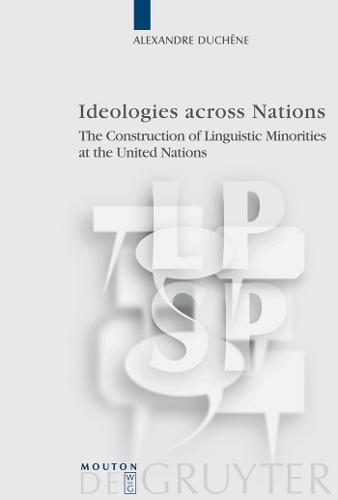Full Product Details
Author: Alexandre Duchêne
Publisher: De Gruyter
Imprint: De Gruyter Mouton
Volume: 23
Dimensions:
Width: 15.50cm
, Height: 1.80cm
, Length: 23.00cm
Weight: 0.620kg
ISBN: 9783110205831
ISBN 10: 3110205831
Pages: 293
Publication Date: 20 October 2008
Recommended Age: College Graduate Student
Audience:
Professional and scholarly
,
Professional & Vocational
Format: Hardback
Publisher's Status: Active
Availability: Awaiting stock

The supplier is currently out of stock of this item. It will be ordered for you and placed on backorder. Once it does come back in stock, we will ship it out for you.
Reviews
By offering an empirical approach to ideological processes, the book showcases how we can be better equipped to understand the complexities of domination and subordination within the nation-state context by adopting a critical approach to language and ideology. Aria Razfar in: Linguist List 21.2592 Alexandre Duch ne 's Ideologies across Nations is a timely contribution to a variety of issues that are becoming increasingly relevant to applied linguistics and sociolinguistics. Such issues include the ways in which institutional practices affect the formulation of policies, possible responses to the challenges of multiculturalism and the politics of identity, and the increasingly complex relationships between communities located at the intra-national, nationaland international levels. Given that much of the recent theorizing regarding multiculturalism has tended to come from political and legal theorists (Benhabib 2002; Ford 2005; Taylor 1994), this book is all the more timely, highligh
By offering an empirical approach to ideological processes, the book showcases how we can be better equipped to understand the complexities of domination and subordination within the nation-state context by adopting a critical approach to language and ideology. Aria Razfar in: Linguist List 21.2592 Alexandre Duchene s Ideologies across Nations is a timely contribution to a variety of issues that are becoming increasingly relevant to applied linguistics and sociolinguistics. Such issues include the ways in which institutional practices affect the formulation of policies, possible responses to the challenges of multiculturalism and the politics of identity, and the increasingly complex relationships between communities located at the intra-national, nationaland international levels. Given that much of the recent theorizing regarding multiculturalism has tended to come from political and legal theorists (Benhabib 2002; Ford 2005; Taylor 1994), this book is all the more timely, highlighting the value of a linguistically sensitive approach. Lionel Wee Hock Ann in: Journal of Sociolinguistics 13.4/2009 Despite this caution and professional cynicism, throughout the volume I detect a note of intelligent optimism regarding the success of interventionist linguistic minority protection. It is as if the author is reminding us that once we can detect what is really going on, behind the scenes and within the text so to speak, we can modify the worst abuses of irrelevance and inactivity as practised by the UN. However, from my point of view, we can only do so if authors as expert and subtle as Alexandre Duchene provide us with the overarching conceptual framework and specific ideological ammunition to fight the good fight. In that respect this is one of the most impressive and powerful illustrations of the claims of critical discourse analysis to shape our thoughts, and I for one am much in the author s debt for his enlightenment of the UN s continued practice of weaving tangle
By offering an empirical approach to ideological processes, the book showcases how we can be better equipped to understand the complexities of domination and subordination within the nation-state context by adopting a critical approach to language and ideology. Aria Razfar in: Linguist List 21.2592 Alexandre Duch ne 's Ideologies across Nations is a timely contribution to a variety of issues that are becoming increasingly relevant to applied linguistics and sociolinguistics. Such issues include the ways in which institutional practices affect the formulation of policies, possible responses to the challenges of multiculturalism and the politics of identity, and the increasingly complex relationships between communities located at the intra-national, nationaland international levels. Given that much of the recent theorizing regarding multiculturalism has tended to come from political and legal theorists (Benhabib 2002; Ford 2005; Taylor 1994), this book is all the more timely, highlighting the value of a linguistically sensitive approach. Lionel Wee Hock Ann in: Journal of Sociolinguistics 13.4/2009 Despite this caution and professional cynicism, throughout the volume I detect a note of intelligent optimism regarding the success of interventionist linguistic minority protection. It is as if the author is reminding us that once we can detect what is really going on, behind the scenes and within the text so to speak, we can modify the worst abuses of irrelevance and inactivity as practised by the UN. However, from my point of view, we can only do so if authors as expert and subtle as Alexandre Duch ne provide us with the overarching conceptual framework and specific ideological ammunition to fight the good fight. In that respect this is one of the most impressive and powerful illustrations of the claims of critical discourse analysis to shape our thoughts, and I for one am much in the author 's debt for his enlightenment of the UN 's continued practice of weaving tan
Author Information
Alexandre Duchêne, University of Teacher Education Fribourg, Switzerland.




